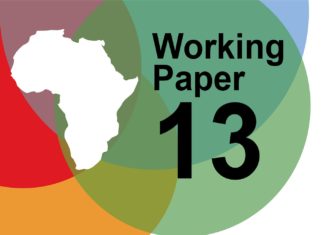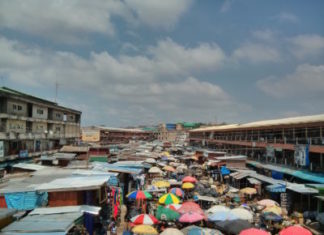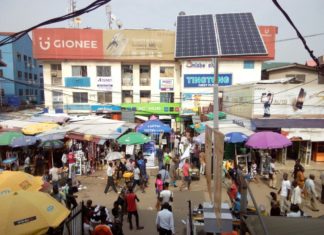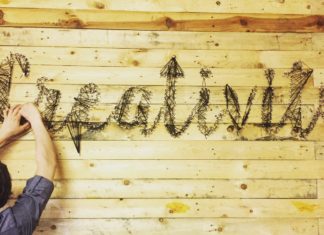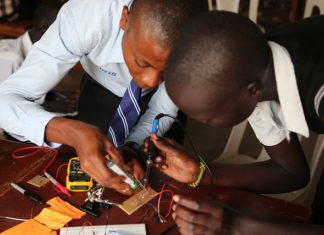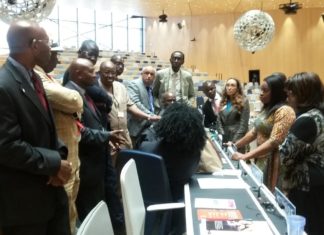Determinants of Innovation in Ethiopian Informal-Sector Micro and Small Enterprises (MSEs)
Authored by: Wondwossen Belete
Abstract: This Working Paper examines the main factors affecting the process of learning and innovation in informal-sector micro and small enterprises...
OPEN AIR AND QES FELLOW EXPLORED THE IP, TK AND GENDER...
By Desmond Oriakhogba
Gender issues are increasingly being discussed with regard to intellectual property (IP) and traditional knowledge (TK), especially from an African innovation perspective. Generally,...
L’accès au savoir en Afrique : le rôle du droit d’auteur
Ce livre, publié en 2011, permet de mieux saisir les enjeux juridiques et pratiques que posent les droits d’auteur pour l’accès au matériel didactique en Afrique et cerne les leçons apprises, les politiques et les pratiques susceptibles d’améliorer cet accès.
Makerspaces and Creativity
Looking back at Open AIR’s ‘Making’ Innovation Happen roundtable
By Sean Boots
In mid August, Open AIR hosted a roundtable discussion on makerspaces and innovation hubs in...
L’Afrique à l’épreuve de la Covid-19
Par Abdelhamid Benhmade
En quatre semaines, la situation est devenue extrêmement alarmante sur le continent africain. « Les populations africaines vivent l’un des pires épisodes pandémiques...
Understanding the Dynamics of Knowledge Transfer in Nigeria’s Otigba Hardware Cluster
So what is the Otigba Computer Village? Oyelaran-Oyeyinka in 2006 described it as the biggest ICT hub of West Africa – perhaps the biggest ICT market in all of Africa – because of the size and the volume of business activities carried out on a daily basis within the cluster. The research I have been conducting looks at the knowledge dynamics at play in the informal ICT businesses in the cluster, with a view to understanding how these dynamics drive informal enterprises’ innovation and scaling-up. While other studies of the cluster have evaluated the size and capacity of the cluster, the evolution of the cluster, mode of operation, performance, sustainability and constraints, there are no studies looking at how the local businesses identify new and useful knowledge. With over 5000 businesses in the cluster, there is bound to be knowledge exchange either through spillover or conscious transfer. How is this happening?
Beyond the Poster Boy of the Maker Movement
Some people tour Europe’s finest vineyards others tour Australia’s sweetest surf spots—I tour South Africa’s pioneer makerspaces; part of the growing global maker movement. The movement is a culmination of people becoming “makers” (someone who uses their personal abilities to create anything from mechanical or electrical to visual or musical) and spaces becoming makerspaces (an interdisciplinary area stimulating people to create by providing resources and idea sharing).
Highlighting Inclusion of Marginalized Voices at International Conferences: A NERG’s experience
By Nicole Tumaine
Over the past four months, I have had the privilege of attending three international conferences as a panelist thanks to the generous...
WIPO Special Committee on Genetic Resources, Traditional Knowledge, and Traditional...
The World Intellectual Property Organization’s specialist committee charged with negotiating text-based instrument(s) for the effective protection of Genetic Resources (GRs), Traditional Knowledge (TK), and Traditional Cultural Expressions (TCEs), on Friday June 16 2017 concluded its 34th session with partial agreement on its mandate and on the fate of the committee and its work program.
Chapitre 2: Cadres d’analyse de l’innovation africaine : l’entrepreneuriat, l’économie informelle...
Jeremy de Beer, Izabella Sowa et Kristen HolmanDate de publication: septembre 2017Télécharger: Chapitre 2: Cadres d’analyse de l’innovation africaine : l’entrepreneuriat, l’économie informelle et...

